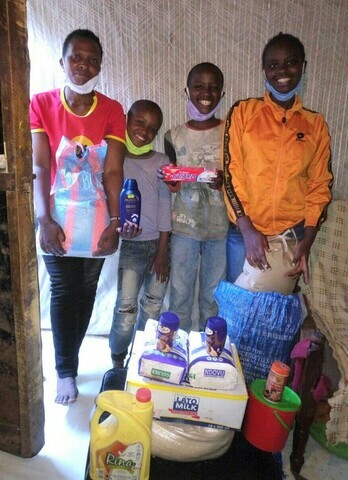For a year, Ryan Cranney had a $100 bill floating around in the center console of his pick-up truck that he had received for his birthday, and now he knew just what to do with it.
Driving to Walgreens, the Latter-day Saint bishop and Idaho potato farmer sent the money to Susan Githumbi, a single mother of three children in Kenya. Githumbi had been struggling providing for her family since the pandemic impacted her country in April 2020. And while quarantine hadn’t been kind to Cranney’s own business during that time, he wanted to do what he could to help her family.
But how did an Idaho farmer and a single mother in Kenya connect during a time of worldwide need in the first place?
The answer, though somewhat unexpected, was simple.
Potatoes.
From Idaho to the Bronx
Ryan Cranney of Oakley, Idaho, has been farming all his life. His company, Cranney Farms, was founded in 1907, and thrives when restaurants purchase potatoes from its harvest in bulk. Food services usually turn those potatoes into French fries—but when restaurants closed their doors during the pandemic, there was a lack of demand for the product.
Since Cranney’s farm needed different equipment to fill grocery store demands, the farmer made a few calls to see if anyone would be interested in purchasing the surplus potatoes. But he didn’t have any luck.
“I could see that there was just no way something like that was going to go,” he says. “[I thought] I might as well just bite the bullet now and get rid of them. I started dumping them on the ground, and I thought about that over the period of several hours after we did, and the thought came to me, ‘Just give them away.’”
He went home that night and talked to his wife about the idea before posting on Facebook that some potatoes were available for those who would “like a few bags.” This was perhaps a bit of an understatement—Cranney was offering to give away a total of 2 million potatoes—and the response was more than he could have imagined. The post quickly grew to over 11,000 shares and more than 1,500 comments after Cranney shared it on April 14.
Over the next three or four days, Cranney responded to people’s comments and questions about his offer as individuals and small groups drove in from as far away as Nevada and Kansas to pick up potatoes. Food banks, retirement communities, and elders quorum and Relief Society presidents from along the Wasatch Front stopped by, taking a trailer or a pick-up load back to share with their community.
“I didn’t really think the response would be as big as it was, to be honest with you,” Cranney says. “But within several hours, people were coming out of the woodwork, first as individuals and small groups. Just car after car after car, like hundreds of cars, just a steady stream—there was like a traffic jam out there. Twenty, thirty cars at a time of people coming to get those.”
News outlets soon picked up on the story. Cranney was featured on Live with Kelly and Ryan, CNN, Fox News, and KTVB, as the farmer was recognized for his generosity in giving away the potatoes, which he could have used to feed cattle or to turn into compost.
His story also made an impact across the country in a very real way—after hearing of Cranney’s plight, a man named John Botti from Westchester, New York, wanted to do something to prevent harvests in the United States from going unused if there wasn’t a demand for the product. According to ABC News, Botti called a few friends and started Farms to Food Banks, sending semi-trucks to farms across the country—Cranney Farms being one of them—and bringing it back to those in New York who were in need.
"I saw the stark juxtaposition of American farmers having their vegetable crops go to waste due to supply chain disruption and economic collapse, while other Americans are on the brink of starvation due to food banks being overwhelmed and undersupplied," Botti posted in April on LinkedIn. "Our home state of New York and the boroughs of New York City have disproportionately borne the economic, health, and social welfare brunt of COVID-19. Many New Yorkers are very sick, out of work, have depleted their savings, and are in dire need of feeding their families to survive. . . . This is a problem that we can help solve together, right now. And I invite you to help."
From Idaho to Kenya
Whether it was social media responses, cards, letters, emails, or even gift packages, Cranney received countless positive reactions for his good deed. For many, his act of service was a piece of good news that inspired communities near and far.
“For whatever reason, this particular story of us giving the potatoes away struck a heartstring with people not only in America, but all over the world,” he says. “Why was that such a human interest story to people? I don’t know the exact answer, but I think part of it is people are tired of being stuck at home listening to depressing, negative news day after day, and this gave them a little bit of a glimmer of something that they could get out and do good for somebody else.”
The potato pile depleted, but Cranney wasn’t finished doing good for other people. Of all the Facebook comments on his post, there was one that stood out among the rest. Githumbi had seen Cranney’s post on social media and responded, saying she wished those potatoes were where she lived. Curious by what she meant by that, Cranney reached out and discovered that Githumbi was from Kenya. He inquired how she was faring during the pandemic.
Githumbi told Cranney that she and her family were starving due to lockdown restrictions which left hundreds of thousands of Kenyans jobless at the beginning of April. According to the Washington Post, the country’s lockdown also includes a dawn-to-dusk curfew, which has resulted in extreme violence and deaths due to police brutality as officers ruthlessly enforce regulations.
“I asked her what it was like in Kenya with the virus, and she described to me how difficult it was, how they were already living hand to mouth. A lot of people there were trying to feed themselves before the virus. But then when the virus came, they have a curfew, and [the government] kind of locked them in their homes so they couldn’t go to work. And so, their ability to earn any income was next to impossible. They were starving.”
Githumbi and Cranney became friends, talking about faith and belief in God over Facebook. As Githumbi never asked for Cranney for anything, the farmer instead offered to help her. She replied that she and her three children simply needed food.

Since he couldn’t send her potatoes from that distance, Cranney instead sent Githumbi his birthday present of $100. Githumbi used the funds to buy flour, dehydrated milk, a bag of sugar, and a jug of cooking oil, which would feed her and her children for several months. These supplies became especially meaningful to the Githumbi family shortly after purchase, as their home was recently destroyed by bulldozers.
According to Reuters, in early May, authorities ordered bulldozers to demolish approximately 600 homes in Nairobi, evicting 5,000 people, many of whom were single mothers and children. “Land is an explosive issue in Kenya, with unscrupulous developers and brokers often selling land with fraudulent title deeds to ignorant homeowners,” Reuters reported.
The eviction also put these individuals at even greater risk of being exposed to the coronavirus as “limited access to water and overcrowding” can make “hand-washing and social distancing an impossibility,” Reuters continued.
When Githumbi told Cranney how their home had been destroyed, she and her children fortunately still had the food they bought from Cranney’s gift. Homeless, they were able to find shelter at a local church overnight, focused on living one day at a time.
Potatoes with a Purpose
After Cranney sent the $100 to Githumbi, he wondered if there was something more he could do for the family. Many people had previously offered to make donations to Cranney Farms in exchange for the potatoes, but the company refused, intending to give them away for free.
But after learning of Githumbi’s circumstances, Cranney wondered if others might be interested in helping his new Kenyan friend and her family. Since then, Cranney has raised roughly $6,000 dollars both online and in personal donations through a GoFundMe to benefit Githumbi and her family, enough to pay for her oldest child to attend college.
Cranney is quick to point out the many examples of how he has seen ministering in action during this experience. Whether it was people picking up potatoes and sharing them with the local community, or Botti helping to feed the hungry in the Bronx, many have been an example of how to share good with the world. And for him, seeing people look out for one another has been nothing short of inspiring.
“The real heroes, or the real story to me are just the thousands of people who’ve been involved in this who have used good for others. That’s truly been an inspiration to me. I know many, many people just in my community who are more giving people and minister so [much] better than I do,” he says. “Most of the people that came to retrieve the potatoes were doing it for somebody else. . . . [they] would gather up and take potatoes to their ministering families, or they would take them back to their ward, or they were taking them to the Catholic church, or the Methodist church, or taking them back to the soup kitchens.”
To say the least, that decision to share his crop with others has also been a faith building experience for the Idaho potato farmer.
“God is good, and His love has come out in so many people of all faiths. That really has been a faith and testimony builder to me in Christ and His love. People that have a genuine and an open heart—it’s very easy for them to be inspired to do good in this world,” he says. “It’s been a fantastic experience.”


